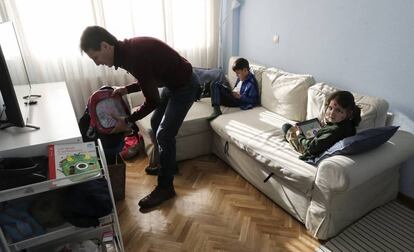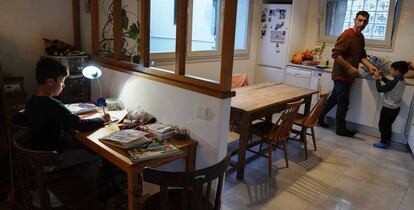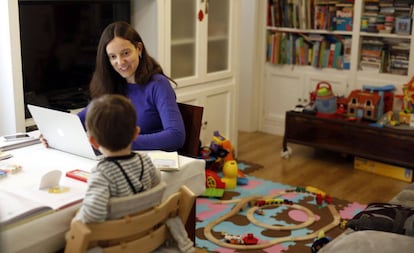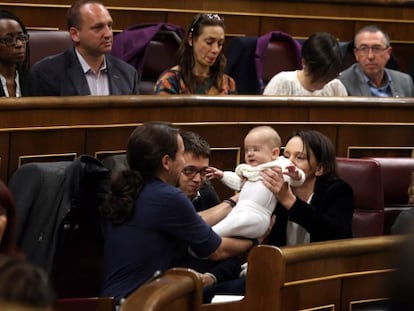The Spanish dads who are staying home to take care of their kids
Growing numbers of men are requesting to use their non-transferable paternity leaves


When Elena Arcos went back to work six weeks after giving birth to her first child, she was confronted by the question: ¡°How can you leave such a young child alone with his father?¡±
The question sums up all the prejudices faced by couples who decide to reject traditional roles and let the man take advantage of the childcare leave offered by Spanish legislation.
The father in question is ?ngel Castro, a 43-year-old computer scientist who used up his wife¡¯s remaining 10 weeks of maternity leave, which she transferred to him, then tacked on his own two weeks of paternity leave. He did this when David was born nine years ago, then again when Elena was born five years ago, although this time the mother stayed home for nine weeks.
¡°I wanted to spend more time with them as babies, which is a period of their lives that you normally miss out on, and one of the nicest ones,¡± says Castro.
The father figure as a provider who imposed his authority and handed out punishment was a decidedly unlikeable character
Constanza Tob¨ªo, sociologist
¡°I¡¯ve always liked my job a lot, and when he suggested it, I thought it was a great idea,¡± recalls Arcos, who is now head of human resources at a company with 80 employees..
For the last six years, Castro has also been putting in 90 fewer minutes every working day, which ends at 4pm for him. When he leaves the French multinational Orange, he still gets home in time to pick up the kids from the school bus drop-off point 45 minutes later. Then comes the second part of the day: fixing snacks, taking the children to afternoon activities and putting in some playtime. Their mother comes home at around 6.30pm and helps David with his homework. Both parents help with dinner and baths before putting the children to bed.
Although it is increasingly normal to see men taking care of their children, Castro¡¯s case is still exceptional. The number of men in Spain who request a reduction of working hours to care for children or dependent adults is on the rise, jumping from 6,100 in late 2008 to 16,400 in 2018, according to the workforce survey Encuesta de Poblaci¨®n Activa (EPA). But that is still less than 5% of the total.
Ra¨²l P¨¦rez, 46, is the only man with a reduction of working hours at the General Council of Economists in Madrid. When his sons Victor and H¨¦ctor, now 13 and 11, were still little, he used to come home at 8pm. ¡°When you get home, even though you try to help, you¡¯re out of the loop because you¡¯ve been out of the house all day,¡± he admits.

P¨¦rez says that his relationship with his partner was taking a hit from all the daily stress. ¡°I could see that she never stopped [doing work at home], that she had no life.¡±
For a year now, this computer scientist has only been working one afternoon out of the week. ¡°The children have reached the age where they need role models, not just caregivers or seeing their mother as some kind of taxi driver taking them from one activity to the next,¡± he says. ¡°We¡¯ve all noticed the difference: we laugh more, we sleep better. Even if we earn less money, our lives are better.¡±
His wife Cristina Peraleda, a government worker, confirms it. ¡°We split up the tasks and we have more time to be together. I¡¯ve also had to get used to having time for myself again.¡±
But even though experts agree that men want to get more involved in child rearing, ¡°this desire does not mean that they are using the work-family balance options at their disposal the way that mothers are,¡± says Jos¨¦ Andr¨¦s Fern¨¢ndez Cornejo, a professor of applied economics at Madrid¡¯s Complutense University.

While social pressure pushes women to use up their maternity leave or risk being judged as ¡°bad mothers,¡± when it comes to men the prevailing fear is that they might be seen as ¡°less ambitious or less committed to their work.¡±
The introduction of a paternity leave that is not transferable has been a decisive step in overcoming this pressure and ¡°building the notion that childcare is also a man¡¯s job,¡± says the sociologist Constanza Tob¨ªo. Originally established at 13 days in 2007, paternity leave is now five weeks, and will be raised to eight on April 1. And if Congress greenlights a recent government decree, by 2021 both men and women will have 16 weeks of leave each.
¡°Visibility is key to male empowerment when it comes to caregiving,¡± says Us¨²e Madinaveitia, founder of the projects #mamiconcilia and #papiconcilia, which collect testimonies from workers who came up against their employer¡¯s opposition when they attempted to reconcile work and family life, and who were fired in some cases.
Fernando Nu?o Santana and Berta Ausin share out the housework ¡°in an equal way, without role differentiation,¡± says Nu?o, a 50-year-old self-employed worker. ¡°I didn¡¯t want to be an absent father, and at that time my job involved constant travel, so I decided to quit and reorganize my career to make it compatible with the value I placed on fatherhood.¡±
Data shows that in 2018, a vast majority of fathers (255,531) used their paternity leave, a number that exceeded the number of maternity leaves (252,706). This is due to the fact that there are more men in the workforce.
Visibility is key to male empowerment when it comes to caregiving
Usu¨¦ Madinaveitia, founder of #mamiconcilia
It also shows that men want to take care of their children. ¡°They are realizing that they are not like their own fathers. The father figure as a provider who imposed his authority and handed out punishment was a decidedly unlikeable character. And men are finding out that childcare can be very satisfying,¡± says Tob¨ªo.
Sergio Simarro, 41, is planning to give it a try next year. A self-employed internet consultant, he is about to have his first child, and he is planning to apply for paternity leave, which in his case will mean €900 a month as he is paying the lowest rate into the Social Security system. After that, he will juggle working from home with childcare when the mother, Marian, goes back to work in the tourism industry. ¡°The decision to stay home and take care of the baby was not based on financial reasons, but because I have more flexibility,¡± he said.?
Simarro, who lives in Alicante, figures that his income will go down by at least 50% the first few months, based on his colleagues¡¯ own experiences. ¡°It will depend on how I handle the incoming projects. It¡¯s a matter of getting organized, of playing with my schedule to find a balance between caring for the baby and getting the work done.¡±
Fern¨¢ndez Cornejo, co-author of the study ¡°Mother-father gap in the use of work-family balance measures and its effect on mother¡¯s careers,¡± explains that the figure of a man involved in childcare has replaced the provider as society¡¯s concept of?¡°a good father.¡± The study, which interviewed 1,785 couples with small children in the Madrid region, found that mothers whose partners are more involved in childcare felt less penalized in their own careers for having children.
English version by Susana Urra.
Tu suscripci¨®n se est¨¢ usando en otro dispositivo
?Quieres a?adir otro usuario a tu suscripci¨®n?
Si contin¨²as leyendo en este dispositivo, no se podr¨¢ leer en el otro.
FlechaTu suscripci¨®n se est¨¢ usando en otro dispositivo y solo puedes acceder a EL PA?S desde un dispositivo a la vez.
Si quieres compartir tu cuenta, cambia tu suscripci¨®n a la modalidad Premium, as¨ª podr¨¢s a?adir otro usuario. Cada uno acceder¨¢ con su propia cuenta de email, lo que os permitir¨¢ personalizar vuestra experiencia en EL PA?S.
?Tienes una suscripci¨®n de empresa? Accede aqu¨ª para contratar m¨¢s cuentas.
En el caso de no saber qui¨¦n est¨¢ usando tu cuenta, te recomendamos cambiar tu contrase?a aqu¨ª.
Si decides continuar compartiendo tu cuenta, este mensaje se mostrar¨¢ en tu dispositivo y en el de la otra persona que est¨¢ usando tu cuenta de forma indefinida, afectando a tu experiencia de lectura. Puedes consultar aqu¨ª los t¨¦rminos y condiciones de la suscripci¨®n digital.










































